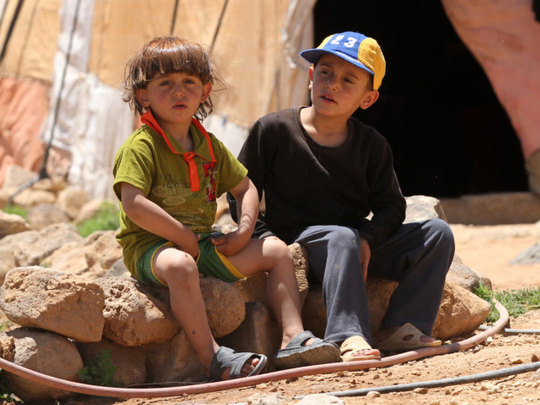
The oasis city of Palmyra has been seized by Daesh (the self-proclaimed Islamic State of Iraq and the Levant). What if Damascus were to fall?
In my head, I go back over the numbers I have come to know so well: Half of the population of Syria forced by the war to flee their homes; more than 7.5 million Syrians internally displaced; a further 3.9 million Syrian refugees, 630,000 of them in Jordan alone. Yet, with outrage and incredulity, we must revise and re-tally these totals as the conflict in the country continues its ravages.
Last weekend, I took my 12-year-old daughter to see Avengers: Age of Ultron. I paid nearly $60 (Dh220) for tickets, popcorn, drinks and snacks. If my wife and son had joined us, it would have cost double, that is: $120 for a couple of hours of 3D superhero mayhem. But for a family of Syrian refugees in Jordan?
That is the difference between having a home and living on the streets; between sending your children to school and having to send them out to work; between just about holding the family together, and having to resort to dangerous survival strategies such as early marriage and prostitution.
Some even return to Syria. Can we be surprised that some families are ultimately forced to take an even higher-risk decision: To make the treacherous journey across the Mediterranean to seek safety in Europe?
A few days before I took my daughter to the movies, I sat with Hassan, a refugee who is the 75-year-old patriarch of a family of 15. Two years ago, he and his clan uncoiled themselves from their roots in Syria and moved to the basement of a dilapidated building in a Jordanian city.
Like 85 per cent of Syrian refugees in Jordan, Hassan’s family chose to live in an urban environment rather than the artificial and unfamiliar setting of a camp. This is despite the services provided in camps and the fact that urban life for refugees can often prove daunting.
UNHCR, the UN refugee agency, estimates that two-thirds of Syrian non-camp refugees live below Jordan’s poverty line, and one in six below the extreme poverty line. Hassan, a spirited man, told me his family savings had long since evaporated. Like the overwhelming majority of Syrians in Jordan, he has no work permit and thus little income with which to pay rent — by far the biggest expense for refugees in Jordan.
I asked how the family survived and Hassan pointed to his daughter-in-law, Fatima, a mother of eight, whose husband — Hassan’s eldest son — was detained in Syria four years ago and has disappeared.
Paradoxically, Fatima’s loss is also the family’s lifeline because it has qualified her for UNHCR’s cash assistance programme, which targets the most vulnerable Syrian refugees living in Jordanian cities. She receives a monthly payment of 120 Jordanian dinars (Dh625) that the family uses to help pay rent and to buy food and school supplies for the children. Fatima’s is one of 21,000 Syrian families who would likely be homeless were it not for this innovative and highly effective programme.
The question of cash versus in-kind donation is an old debate in the humanitarian world. A donor’s impulse to send shoes or blankets is understandable, but the reality is that all items are a representation of monetary value. They have a price tag and they are often sold in order to serve a more pressing need. Cash gives refugees freedom of choice over what best meets their families’ specific requirements. It restores a sense of dignity. It is also a speedier method of assistance. Items have to be shipped, received, warehoused and distributed through special centres, a process that can take weeks or even months. Cash reaches the beneficiary in a matter of days, if not hours.
There is also an obvious cost-saving in the process. In Jordan, out of every $100 that UNHCR receives, $98 is delivered directly to the families who need it. That is almost impossible to achieve with in-kind assistance. And, in Jordan, the cash programme is fraud-free as it uses iris-scanning biometric technology, ensuring that only the intended recipient can receive the cash. No ATM card, no pin number.
And at a time when there is great strain on Jordanian services, infrastructure and society because of the influx of Syrian refugees, cash helps the local economy and enables refugees to integrate better. There is less stigma attached to it: no queueing at public distribution centres, no vouchers in supermarkets.
I asked Hassan how his family would cope without the cash assistance. He smiled, then sighed, as if from a deep well of weariness. “Well, God is here,” he said. That was answer enough for me.
— Financial Times
Khaled Hosseini is an author of novels including The Kite Runner and a goodwill ambassador for UNHCR, the UN Refugee Agency.
For more info on Khaled’s visit to Jordan please click here:
For more on UNHCR’s cash assistance program, please visit this site.










